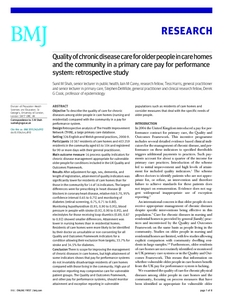Shah, SM; Carey, IM; Harris, T; Dewilde, S; Cook, DG
(2011)
Quality of chronic disease care for older people in care homes and the community in a primary care pay for performance system: retrospective study.
BRITISH MEDICAL JOURNAL, 342 (d912).
ISSN 1756-1833
https://doi.org/10.1136/bmj.d912
SGUL Authors: Carey, Iain Miller Cook, Derek Gordon De Wilde, Stephen Harris, Teresa Jane Shah, Sunil Mulji
![[img]](https://openaccess.sgul.ac.uk/239/1.hassmallThumbnailVersion/bmj.d912.pdf)  Preview |
|
["document_typename_application/pdf; charset=binary" not defined]
Published Version
Download (132kB)
| Preview
|
Abstract
OBJECTIVE: To describe the quality of care for chronic diseases among older people in care homes (nursing and residential) compared with the community in a pay for performance system.
DESIGN: Retrospective analysis of The Health Improvement Network (THIN), a large primary care database.
SETTING: 326 English and Welsh general practices, 2008-9.
PARTICIPANTS: 10,387 residents of care homes and 403,259 residents in the community aged 65 to 104 and registered for 90 or more days with their general practitioner.
MAIN OUTCOME MEASURE: 16 process quality indicators for chronic disease management appropriate for vulnerable older people for conditions included in the UK Quality and Outcomes Framework.
RESULTS: After adjustment for age, sex, dementia, and length of registration, attainment of quality indicators was significantly lower for residents of care homes than for those in the community for 14 of 16 indicators. The largest differences were for prescribing in heart disease (β blockers in coronary heart disease, relative risk 0.70, 95% confidence interval 0.65 to 0.75) and monitoring of diabetes (retinal screening, 0.75, 0.71 to 0.80). Monitoring hypothyroidism (0.93, 0.90 to 0.95), blood pressure in people with stroke (0.92, 0.90 to 0.95), and electrolytes for those receiving loop diuretics (0.89, 0.87 to 0.92) showed smaller differences. Attainment was lower in nursing homes than in residential homes. Residents of care homes were more likely to be identified by their doctor as unsuitable or non-consenting for all Quality and Outcomes Framework indicators for a condition allowing their exclusion from targets; 33.7% for stroke and 34.5% for diabetes.
CONCLUSION: There is scope for improving the management of chronic diseases in care homes, but high attainment of some indicators shows that pay for performance systems do not invariably disadvantage residents of care homes compared with those living in the community. High use of exception reporting may compromise care for vulnerable patient groups. The Quality and Outcomes Framework, and other pay for performance systems, should monitor attainment and exception reporting in vulnerable populations such as residents of care homes and consider measures that deal with the specific needs of older people.
| Item Type: |
Article
|
| Additional Information: |
PubMed ID: 21385803
© Shah et al 2011. This is an open-access article distributed under the terms of the Creative Commons Attribution Non-commercial License, which permits use, distribution, and reproduction in any medium, provided the original work is properly cited, the use is non commercial and is otherwise in compliance with the license. |
| Keywords: |
Aged, Aged, 80 and over, Chronic Disease, England, Female, Health Services for the Aged, Homes for the Aged, Humans, Male, Nursing Homes, Primary Health Care, Quality of Health Care, Reimbursement, Incentive, Retrospective Studies, Wales, Science & Technology, Life Sciences & Biomedicine, Medicine, General & Internal, General & Internal Medicine, HEART-FAILURE, NURSING-HOMES, OF-CARE, RESIDENTS, MANAGEMENT, DATABASE, HEALTH |
| SGUL Research Institute / Research Centre: |
Academic Structure > Population Health Research Institute (INPH) |
| Journal or Publication Title: |
BRITISH MEDICAL JOURNAL |
| ISSN: |
1756-1833 |
| Related URLs: |
|
| Dates: |
| Date | Event |
|---|
| 8 March 2011 | Published |
|
| Web of Science ID: |
WOS:000288446800007 |
  |
Download EPMC Full text (PDF)
|
 |
Download EPMC Full text (HTML)
|
| URI: |
https://openaccess.sgul.ac.uk/id/eprint/239 |
| Publisher's version: |
https://doi.org/10.1136/bmj.d912 |
Statistics
Item downloaded times since 30 Apr 2012.
Actions (login required)
 |
Edit Item |



